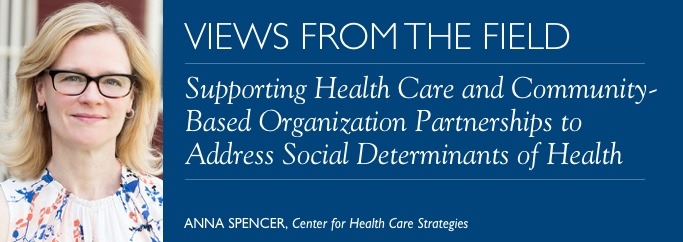Marin Community Foundation: October 2024
Episcopal Health Foundation’s (EHF) annual poll shows continuing health care affordability and access crisis in Texas. EHF’s poll found that 64 percent of Texans said they skipped or postponed some sort of health care because of the cost. That includes things like check-ups, treatments, tests, filling prescriptions, and dental care. That percentage is slightly down from the 68 percent who said they skipped care last year – the highest percentage in the six-year history of EHF’s poll.
Health and Social Care Integration: Five Years of Progress on a National Academies Report
Historically, social determinants of health (SDOH) have not been addressed in health care visits. However, whether someone has a safe place to live or healthy food to eat directly impacts health. Other SDOH outlined by the Office of Disease Prevention and Health Promotion include economic stability, education access and quality, neighborhood and build environment, social and community context, and healthcare access and quality. It is critical that health care providers understand individuals’ experience of these domains; without this, the care provided is not patient-centered and does not fully address health and well-being.
Improving the Lives of Children and Families – The Hidden Gem of the Tax Code
Please join the Tax Equity Funders Network for an in-person convening titled, “Improving the Lives of Children and Families – The Hidden Gem of the Tax Code” as part of the 2024 Prosperity Summit.
Connecting Mental Health and Wealth in North Carolina
Mental health and wealth are inextricably linked, influencing each other bidirectionally. While many factors contribute to mental health, we know from the social determinants of health that the most foundational are socioeconomic, including income, wealth, and safe neighborhoods. Asset Funders Network defines wealth in an assets-to-debt ratio.
The Impacts of the Climate Crisis on Mental Health: Research, Solutions, and Action
During this interactive conversation with mental health experts, Gen Z, and climate-mental health advocates, speakers shared the latest research on the impacts of climate change and mental health on young people and the disproportionate impacts on Black, Indigenous, and people of color. The field leaders also discuss the political and cultural dimensions of the foundation community addressing this emergent public health issue.
Episcopal Health Foundation: November 2022
Key findings from a new statewide survey on social determinants of health say that medical care alone isn’t enough for a person to live a healthy life, so the state should invest more resources to address non-medical factors like unemployment, neighborhood conditions, and housing.
Transforming Communities Through the Social Determinants of Health
Six years ago, Palm Health Foundation made a risky decision. Dissatisfied with the short-term gains of traditional responsive grantmaking, we launched the Healthier Together initiative in an effort to forge a deeper connection to community through the social determinants of health.
Managing America’s Crises Means Addressing the Political Determinants of Health
Too often we stop at these social drivers of inequities, however, and miss the link between social determinants of health and their political roots. Every social determinant of health is preceded by a political action, inaction, or impetus. Political determinants of health create the social drivers—including poor environmental conditions, inadequate transportation, unsafe neighborhoods, and lack of healthy food options—that affect all other dynamics of health.
Who Will Pay for Partnerships that Address Social Determinants of Health?
Relationships between health care institutions and networks of community-based organizations can improve health outcomes, but what does it really cost, and who should pay?
Supporting Health Care and Community-Based Organization Partnerships to Address Social Determinants of Health
Increasingly, health systems, providers, and payers recognize the significant influence that social factors such as housing, food insecurity, employment status, and transportation have on well-being and health care spending.
Newsletter Sign Up
Want to sign up for the GIH Bulletin? Click here to get on the list.
Contribute to the GIH Bulletin and Blog
If you are interested in contributing your story or expertise to the GIH community please review our Editorial Submission Guidelines.







